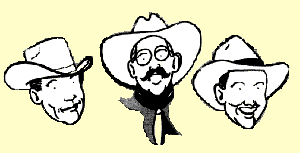As news of the sexual
revolution became old news, the cowboys realized
that they had not been footnoted in this part of
history. One day, in a sublime moment of clarity,
this fact hit the cowboys like a crate of
horseshoes. And it hurt. To solace themselves, they
took to putting bumper stickers on their pick-ups
that read, "Cowboys Make Better Lovers." But the
façade was too transparent. They weren't fooling
anyone and the hippie men weren't about to let them
get away with it either -- not after having been
called unmanly names umpteen thousand times. No sir.
The next day dawned clear and bright, and every VW
Microbus in the country had a sticker on it that
read, "Cowboys Suffer From Feelings of Sexual
Inadequacy."
The retort struck
home and its unvarnished truth was too much for the
cowboys. Reeling beneath their hats, hopelessly
outclassed and overwhelmed by the sheer power of the
hippies' simple, literate rejoinder, the cowboys
reassessed the situation, reconnoitered, and decided
to cut their losses by removing the stickers the
very next day. And at once the hippies responded in
kind. A day later, you could look at any microbus
from Maine to Albuquerque, from Taos to Bisbee, from
Flagstaff clean to Klamath Falls and there was no
sign that the fierce rebuttal had ever been penned
and plastered there. "You don't beat a man when he's
down," was the hippies' reasoning. "Wage peace."
Miraculously this was
not lost on the cowboys. They mulled it over -- this
reciprocal overture to them -- and they continued
their historic transformation and reformation. They
carried on with what was surely the most remarkable
pilgrimage of introspection ever embarked upon.
The cowboys began to
learn things they had never known before. They met
new people. Soon the cowboys saw, yet dimly, that
there were other lives that people led -- different
lives from theirs, but somehow inextricably linked
to theirs. Sometimes, they found it was fun to revel
in their differences -- more fun and rewarding by
far than shouting hurtful names at those who were
somehow different.
Once, in the Palomino
Club, I sat as one new to the company of cowboys, a
hippie losing his hair. The TV blared above the bar
and on it suddenly appeared the specter of the
police beating an African American man. It was ten
against one, and the clubs rained down. I dare not
guess what the unreconstructed cowboy might have
said at this sight. All I heard, however, were the
words of one slow-drawling buckaroo who shook his
head and said, "Hell's bells. You don't beat a man
when he's down." Yes, the cowboys were learning and
they were growing, but they had not entirely lost
their hats. Not yet.
The cowboys could
still be seen in the airport waiting gates when they
traveled, sporting their biggest hats and
jawing and alolligagging and laying it all on just
too, too daggunned thick. Each cowboy was
still too often attending his own private masquerade
ball and that would have to change. And change it
did when law enforcement cowboys somehow got
permission to wear their hats on the job.
The cowboy cops were
naive and unsophisticated and they thought that the
hats would please the public. They thought they were
providing a bit of welcome western color for all to
share. But the public had no urge to fantasize that
they lived in Dodge City. They were practical,
hardworking folk and to them the hats carried an
entirely different connotation -- one that they just
plain didn't like. They had all seen In the Heat
of the Night with Sidney Poitier and they
weren't about to brook any nonsense in their
town from any redneck cowboy cops who didn't have
the common horse sense to get rid of their hats
before there was trouble.
The disapproval was
directed at the hats and it was nation-wide. Anger
and resentment grew and the cowboys were but faintly
aware of it. When at last it came pouring out in a
collective American shout of judgment, the cowboys
were unprepared, and yet the message was loud and
clear even to them and they knew what they must do.
The cowboy cops
attempted to work and people would roll down their
windows and shout the message. When the cowboys
drove their trucks, people gathered at the roadside
to give the battle cry. There was no escaping it,
and the words of simple and unrefined disapproval
were always the same. They were, "Nice hat,
JACKASS!"
And as if by magic at
these words there was a mystical whooshing sound as
the hats were swept from the cowboys' heads. And
along with the hats went the gun racks and the
intolerance and all the rest that had kept the
cowboys from living out their destinies as the true
American Cowboys they were meant to be.
Whoosh! went the hats
across the eastern seaboard over the Adirondacks.
Whoosh! across the South. Whoosh! Whoosh! went the
hats from the Iowa corn land to the lake country of
Minnesota. Whoosh! over the Great Plains and over
the still, checkered fields and the great granite
mountains and the green valleys and the sandstone
canyons and the diamond deserts!
The transformation
that day was at last complete. The cowboys had
fulfilled their quest.
I suppose there are
more important dates in the history of our great
nation -- more important turning points: our first
day of independence, the close of the Civil War,
D-Day, the day that Kennedy died, the day the
Beatles invaded our shores. But there is none so
undeservedly shrouded and forgotten in the amnesia
of our new times as the day the cowboys lost their
hats.

